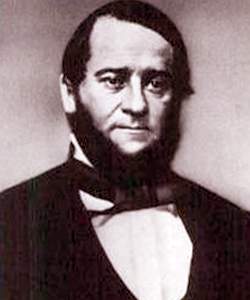Wilmer McLean (Tremain, 1904)
Scholarship
The memorable interview between Generals Grant and Lee took place a little after 2 P. M., in the "town" of Appomattox Court House. The town, according to description, had little indeed to recommend it for the scene of so great an event as the pacification of a continent. It might boast, indeed, its public building, the Court House, but it consisted solely of one street, and one end of that was boarded up to keep the cattle out. Such was the little place upon which fame, for centuries to come, was suddenly thrust, this Sunday afternoon, 9th April, 1860. The best house in the street was lent for the occasion by its owner, Mr. Wilmer McLean. It is an old-fashioned structure, with a long verandah in its front and a flight of steps leading up to the entrance thereon. "Appomattox Court House boasted five dwellings. The largest — a square building of brick, with a yard smiling with roses, violets and daffodils — belonging to one Wilmer McLean."
Lossing states that this McLean resided in a dwelling on a portion of the first battlefield of the war, between the Confederate "Army of Northern Virginia," under Beauregard, and the Union " Army of North-eastern Virginia" — under the accomplished but unlucky McDowell— which was the nucleus or embryo of the ''Army of the Potomac.'' Beauregard had his headquarters in McLean's house, which was situated to the right or south of the Centreville road, about equidistant from Mitchell's, Blackburn's and McLean's Fords. McLean, having seen enough, as he thought, of war, removed to a spot whereto he was confident war could never come, but whither the fighting did come, after a lapse of three years and nearly nine months, in its circle of blood and fire.
Lossing states that this McLean resided in a dwelling on a portion of the first battlefield of the war, between the Confederate "Army of Northern Virginia," under Beauregard, and the Union " Army of North-eastern Virginia" — under the accomplished but unlucky McDowell— which was the nucleus or embryo of the ''Army of the Potomac.'' Beauregard had his headquarters in McLean's house, which was situated to the right or south of the Centreville road, about equidistant from Mitchell's, Blackburn's and McLean's Fords. McLean, having seen enough, as he thought, of war, removed to a spot whereto he was confident war could never come, but whither the fighting did come, after a lapse of three years and nearly nine months, in its circle of blood and fire.
Henry Edwin Tremain, Last Hours of Sheridan’s Cavalry (New York: Bonnell, Silver & Bowers, 1904), 483-84.


